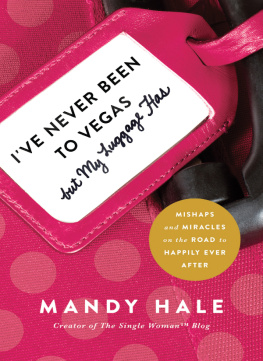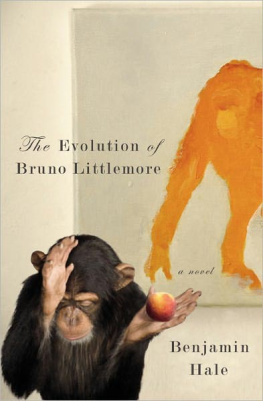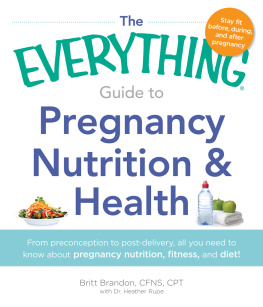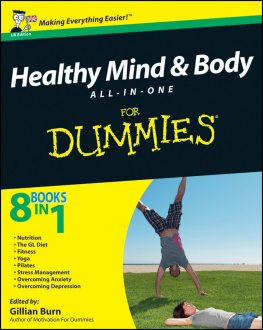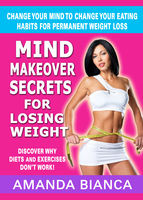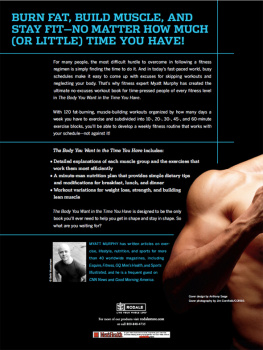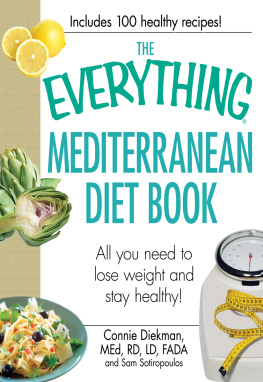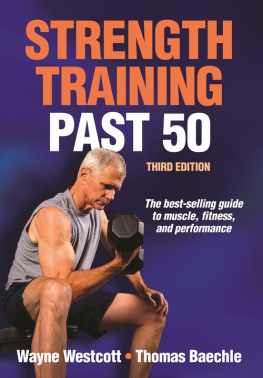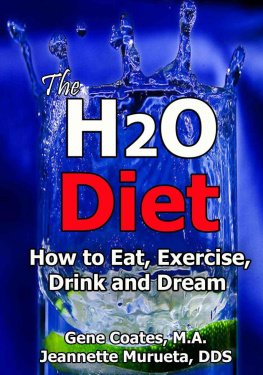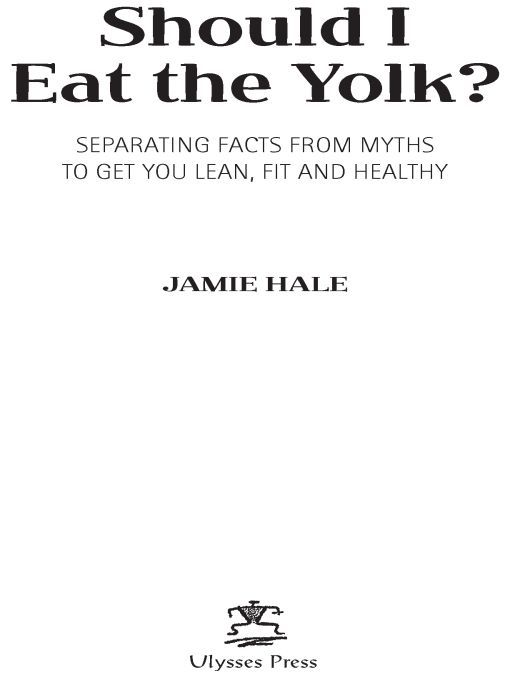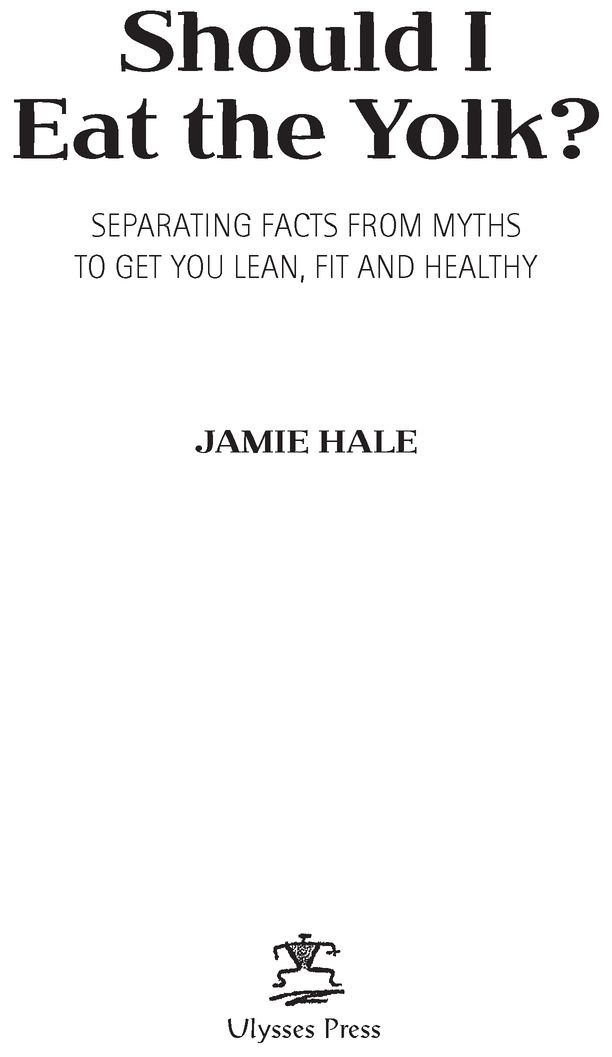Table of Contents
This book is dedicated to my wife, Brooke. You have been saying for years I need to write a book for the lay public. Its finally here. Enjoy.
ACKNOWLEDGMENTS
I would like to thank the HNE Research Group and all of my research associates for helping me gather the data that was necessary to write this book.
INTRODUCTION
Do I really need to drink 8 glasses of water a day?
Should I eat only low glycemic index carbohydrates when trying to lose weight?
Will heavy weight training make me bulky?
Should I eat the yolk?
These are just a few of the many questions that people interested in their health ask. With so much information available on health, exercise, and nutrition, finding the answers shouldnt be a problem. The information can be found in books, on the World Wide Web, and in the media. But with so much information out there and new facts coming out seemingly every week, the problem is sorting through it all and figuring out what is correct.
The first section of this book addresses health and nutrition claims. Each claim is presented in a question-and-answer format; this is followed by an investigation of the research on the subject. Here are some of the questions investigated: Is bottled water safer to drink than tap water? Should food enjoyment be considered when dieting? Does eating specific types of foods together cause weight gain? Many more questions are discussed.
The second section addresses exercise claims. These (and many other) questions are discussed: Will exercise get rid of cellulite? Does heavy weight training decrease flexibility? Are certified fitness trainers highly qualified trainers?
In the final section of the book, popular diet plans are analyzed, including the Atkins Diet, the South Beach Diet, Nutrisystem, the maple syrup diet (the diet that Beyonc Knowles used to shed pounds for Dreamgirls), Weight Watchers, Jenny Craig, and many more. How nutritionally sound are these diets? Are any of them for you? Read the analysis and decide.
For much of my life, I have been involved with sports and fitness. At an early age, I received my first weight set and began participating in martial arts. In college, I was the founder and president of Eastern Kentucky Universitys boxing team. Shortly after graduating from college, I opened up the gym Total Body Fitness (one of the top 30 gyms in the country, according to Mens Health), which I owned and managed for eleven years before selling it in 2008.
While I owned Total Body Fitness, I competed as a bodybuilder, began my writing career, founded HNE Research Group (a group that analyzes and writes about scientific research), lectured about health and fitness, and continued to participate in martial arts. From my preteen years to the present day, I have had a passion for fitness and fitness education. Currently, I spend six to eight hours a day conducting research and another three to four hours designing fitness plans. My personal exercise regimen includes a wide array of activities: kayaking, weight training, kickboxing, skateboarding, and so on.
It was my never-ending quest for knowledge about fitness that led me to write this book.
CHAPTER 1
HEALTH AND NUTRITION CLAIMS
Do high insulin levels cause obesity?
ANSWER: Elevated insulin levels do not cause obesity. Obese people who eat excessive calories may also have high insulin levels. Do not mistake correlation for causation. Fat gain is the result of excessive calories.
INVESTIGATION: This subject has been misunderstood in the fitness industry for years. Many experts blame obesity on elevated insulin, but the scientific data do not support this claim. Insulin plays numerous roles in metabolism, but popular diet gurus generally have no idea of the complexity and the various effects that insulin has on the body.
Calorie restriction, independent of diet composition (for example, 15 percent to 73 percent carbohydrate) improves glycemic control (blood glucose control). The ability to lose weight on a calorie restricted diet over a short-term period does not vary in obese healthy women as a function of insulin resistance (decreased ability of target tissues to respond properly to insulin) or hyperinsulinemia (high insulin levels), says nutrition researcher M. R. Freedman.
A review by Freedman, published in Obesity Research, in March 2001, reported that subjects consuming 1,000-calorie diets containing 15 percent carbohydrate had significantly lower insulin levels compared with those consuming 1,000-calorie diets containing 45 percent carbohydrate. Yet there was no difference in weight loss between the two groups. In the review, a study was cited where researchers studied 10 obese patients who were fed low-calorie (1,500 calories a day) liquid formula diets containing either 72 percent or 0 percent carbohydrate for four weeks before switching to the other diet. A significant reduction in insulin levels was noted when subjects consumed the formula containing 0 percent carbohydrate. Refeeding the high-carbohydrate formula resulted in a marked increase in insulin. However, patients lost 0.75 to 2.0 kg a week, irrespective of caloric distribution.
Recently, studies have shown that the selective genetic disruption of insulin signaling in the brain leads to increased food intake and obesity in animals. This demonstrates that intact insulin signaling in the central nervous system is required for normal body weight regulation.
Is it all right to eat fruit when dieting?
ANSWER: Fruit is highly recommended while dieting. Fruit is low in calories, is nutrient dense, contains fiber, and can be very filling (particularly fruits that contain a fair amount of soluble fiber, for example, apples). In addition, fruit soothes the sweet tooth for many people.
INVESTIGATION: The fear of fruit comes from the relatively high sugar content in fruit and the potential for weight gain.
Some studies have suggested that 60 grams or more of fructose a day can stimulate de novo lipogenesis (the process whereby excessive carbohydrates are converted to triglycerides in the liver), increase blood triglycerides, and induce insulin resistance (decrease the ability of target tissues to respond properly to insulin). This could contribute to weight gain and health problems. But keep in mind that a piece of fruit generally contains only 6-7 grams of fructose. You would have to eat a very large amount of fruit to get 60 grams of fructose. In most studies, the high consumption of fructose is generally due to the consumption of high levels of high-fructose corn syrup. Another consideration is that fructose causes minimal insulin secretion. So even if fructose consumption was high enough to elevate fat synthesis, a lack of insulin would probably result in increased fat burning. Assuming a calorie deficit, it all evens itself out at the end of the day.
What about the sugar content of fruit? Isnt sugar a no-no when dieting? Its important to realize that there are various types of sugars. According to the Advanced Carbohydrate Classification System, sugars include glucose, fructose, galactose, sucrose, maltose, lactose, and a few others. Fruits contain glucose, fructose, and sucrose in varying degrees. Do these sugars contribute to obesity? They can contribute to obesity if you consume excessive amounts. But if eaten in moderation, they do not promote obesity.



